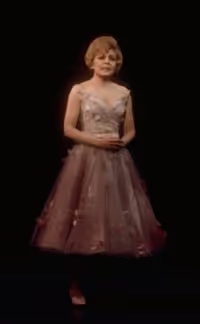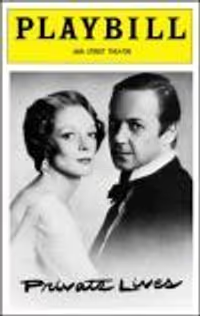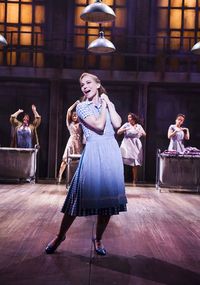Estate of Edward Albee Yanks Rights to Production Over Casting of Black Actor
kaykordeath
Stand-by Joined: 4/14/17
trpguyy
Broadway Legend Joined: 2/25/05
#2Estate of Edward Albee Yanks Rights to Production Over Casting of Black Actor
Posted: 5/18/17 at 4:58pm
"Authorial intent wins. Period. As a Dramatists Guild Council member, I will tell you this. As an artist and as a human I will tell you this. Authorial intent wins... Frankly, this is why it's so important to me, we're one of the last entertainment mediums that has that power. You go to Hollywood, you sell a script, they do whatever and your name is still on it. What we protect at the Dramatists Guild is the author's power over their words and what happens with them. It's very cut and dry." - Lin-Manuel Miranda
https://www.broadwayworld.com/article/HAMILTONs-Lin-Manuel-Miranda-Speaks-On-Race-and-Casting-20151203
#3Estate of Edward Albee Yanks Rights to Production Over Casting of Black Actor
Posted: 5/18/17 at 5:03pm
But did Albee ever specify the race of Nick? If he wrote a character whose race is explicitly identified, that is a different matter.
#4Estate of Edward Albee Yanks Rights to Production Over Casting of Black Actor
Posted: 5/18/17 at 5:04pm
All of this just makes me sad.
I can't recall anything in the text that wouldn't allow for Nick to be black. Smells like racism to me.
trpguyy
Broadway Legend Joined: 2/25/05
#5Estate of Edward Albee Yanks Rights to Production Over Casting of Black Actor
Posted: 5/18/17 at 5:07pm
From the article:
"However, if this is true, then it follows consistent with what has happened in the past when producing Albee shows and the nit-picking of their casting. Albee was known for being outspoken about sticking to the playwright’s intentions. So yanking rights from a production over the race of its casting isn't completely unrealistic here. I was once told that a production of Three Tall Women had to report the actual heights of the women playing the roles."
I believe the "playwright's intentions" can extend beyond what's written in the text of the play. Maybe Albee had said something or written elsewhere about his intentions for the casting of the play. I certainly don't know, but the people representing the Albee estate probably do.
nasty_khakis
Broadway Legend Joined: 3/15/07
#6Estate of Edward Albee Yanks Rights to Production Over Casting of Black Actor
Posted: 5/18/17 at 5:11pm
I assume this is because making Nick a different race in a play with a specific setting during a specific time period adds some levels and themes to the play the author may not want. I think making Martha seducing a young black man and Nick and Honey being a mixed race couple could be a really interesting thing that could add to the tensions mounting in the play, but clearly Albee disagreed.
#7Estate of Edward Albee Yanks Rights to Production Over Casting of Black Actor
Posted: 5/18/17 at 5:23pm
Well, Albee is dead, so he didn't personally disagree to this but of casting.
Obviously the Albee estate needs to respond to this, but if this allegation is true it's a pretty awful look for them. Nothing in the script of Virginia Woolf explicitly states the race of the characters- I can't think of any legitimate reason for blocking this casting. At best, it looks like obsessive deference to authorial intent, which might be legal but strikes me as absurd.
#8Estate of Edward Albee Yanks Rights to Production Over Casting of Black Actor
Posted: 5/18/17 at 5:29pm
I certainly see both sides of the argument, but I'm leaning towards the ability to cast a diverse Nick (and George, Martha, and Honey). I understand why it was important for all characters to be white in the original 1962 production because of the powerful repudiation of the so called American dream (and the social mores of the 50s). However, the play is such a classic and is produced so often (and has a very successful film version) that I can't see the real reason in 2017 to keep the cast all white. Most people know what the play is about and while the play is set in the 60s there really aren't that many references that would make people question Nick's race. And besides, I don't think in 2017 the fact that Martha is seducing a black man rather than a white one would really bring out that much more in the text - it certainly would have in 1962, but I would like to think that theatre has moved past that.
As a side note, one of the things I remember most clearly about the original drafts of Virginia Woolf that Albee donated to the NYPL, was the fact that Nick's original name was "Dear" - so it was Honey and Dear. Albee changed Dear to Nick (his name is never said in the play) but kept Honey the same (it's never clear if that is her nickname or actual name).
#9Estate of Edward Albee Yanks Rights to Production Over Casting of Black Actor
Posted: 5/18/17 at 5:30pm
It's specified that Nick is blonde in the script which would seemed to indicate that he is not African American. Obviously, there've been a lot of non-blonde Nick's, tho.
This production only sought to cast a black actor in the role of Nick. This isn't the case of them casting the best actor for the part. A black actor playing Nick was apparently a part of the concept of the production. I can see a playwright trying to protect a play that's not about race from a director who is trying to make it a play about race. All that said, I don't really think it's worth denying an actor a role. It seems fairly petty to deny any production free reign over casting... particularly from beyond the grave.
#10Estate of Edward Albee Yanks Rights to Production Over Casting of Black Actor
Posted: 5/18/17 at 5:32pm
For those of you trying to use the authorial intent argument, there have been several prior productions of VIRGINIA WOOLF that featured minority actors. One that comes to mind immediately is a 2002 Oregon Shakespeare Festival production in which Andrea Frye, who is black, played Martha. Her George, Richard Elmore, is caucasian.
#11Estate of Edward Albee Yanks Rights to Production Over Casting of Black Actor
Posted: 5/18/17 at 5:35pm
At the end of the day, it just seems bizarre to me that the Albee estate would go after this one production. Have they ever cancelled a production because of a brunette cast as Nick? Did they check in to make sure any non-blonde Nicks dyed their hair before opening night?
Had they said nothing, I doubt anyone outside of the area would have taken notice of the production. But now, even if they have the right to do it, they look foolish for no reason whatsoever.
#12Estate of Edward Albee Yanks Rights to Production Over Casting of Black Actor
Posted: 5/18/17 at 5:40pm
I agree that it's a weird hill to pick to die on.
That said..."Have they ever cancelled a production because of a brunette cast as Nick? Did they check in to make sure any non-blonde Nicks dyed their hair before opening night?" is actually something Albee would do while still alive. There's even a rumor that the height of the actresses cast in Three Tall Women needed to be sent before rights were approved.
trpguyy
Broadway Legend Joined: 2/25/05
#13Estate of Edward Albee Yanks Rights to Production Over Casting of Black Actor
Posted: 5/18/17 at 5:42pm
AC126748 said: "For those of you trying to use the authorial intent argument, there have been several prior productions of VIRGINIA WOOLF that featured minority actors. One that comes to mind immediately is a 2002 Oregon Shakespeare Festival production in which Andrea Frye, who is black, played Martha. Her George, Richard Elmore, is caucasian. "
That tells me that the estate didn't know or didn't care then. It doesn't mean that they can't now, and it in no way counters the "authorial intent" argument.
Having said that, I do have to wonder if this director or company did something else to piss them off.
#14Estate of Edward Albee Yanks Rights to Production Over Casting of Black Actor
Posted: 5/18/17 at 5:45pm
Regardless of authorial intent or not, this was a bad move on the part of the Albee estate. This is going to do nothing but look bad for them.
#15Estate of Edward Albee Yanks Rights to Production Over Casting of Black Actor
Posted: 5/18/17 at 5:48pm
That tells me that the estate didn't know or didn't care then. It doesn't mean that they can't now, and it in no way counters the "authorial intent" argument.
Actually, it does, because the author was alive at the time of that production. If he felt that having an actor of color in one of the roles undermined his play, he could have personally blocked it. You err in placing blind faith in the concept that an author's estate always has the best interest of his work at heart.
trpguyy
Broadway Legend Joined: 2/25/05
#16Estate of Edward Albee Yanks Rights to Production Over Casting of Black Actor
Posted: 5/18/17 at 5:53pm
This has much more info than the originally-linked blog, including memos from the Estate
http://jezebel.com/did-the-edward-albee-foundation-deny-rights-to-a-play-b-1795345657
Apparently the company cast and advertised the show before actually securing the performance rights, which is a no-no.
#17Estate of Edward Albee Yanks Rights to Production Over Casting of Black Actor
Posted: 5/18/17 at 5:54pm
OK kids, here are the facts for anyone who cares.
1. The estate's decision is 100% consistent with Albee's intentions as he repeatedly expressed (and no doubt put in writing).
2. The notion that the script is some sort of contract, and that anything silent in it is fair game, is 100% wrong. An author is licensing the script subject to the rights agreement, and can retain whatever approval he or she wants, consistently or inconsistently, down to the name of the actor and the color of their nail polish.
3. This is not a case of color-blind casting; it is a case in which the casting was expressly for a person of color. When a production inserts words in the breakdown, it is no different than inserting words in the script. Comparing it to various color blind casting examples is apples and oranges.
4. It is the height of incompetence to think that you can cast in this way without clearing it in advance. Especially with Albee.
5. The Albee estate is in synch with Albee and his wishes. So unless you think Albee's actions were not in the best interests of his work, that suggestion is WAY off base.
#18Estate of Edward Albee Yanks Rights to Production Over Casting of Black Actor
Posted: 5/18/17 at 5:58pm
What bothers me most about this is not the fact that the estate did what they did (though I wish they hadn't). I think the references to Nick being white put this situation within their legal rights.
What bothers me most is the system itself. I think authorial intent, up to a certain extent, is bull. One look at what we do with Shakespeare nowadays will show that his authorial intent means absolutely nothing to our society today - so why do we stick so slavishly to these things with more recent playwrights (I realize it's the copyright law, but I'm speaking philosophically)? I think there are situations, in race-specific plays like The Mountaintop, Ragtime, etc. where race is so integral to the character and the plot that it should not be changed. But that, to me, is more about keeping the show cohesive and making sense on the most basic level. Removing the lines about Nick's race would not change the story or really the character at all, and the thing about interracial marriage could so easily be overlooked with just a dash of suspension of disbelief (a la, black actors in Les Mis, etc.).
Also, I agree with the comments about the non-blond Nicks. I just did a google image search of "Nick Who's Afraid of Virginia Woolf, and I found about 5 brown-haired Nicks within a few seconds of scrolling. Clearly those productions didn't get shut down. So why are they targeting this one? Whether they are aware of it or not, I think they are being racist in the way they target this production, and the system is set up in such a way that they are within their rights to do so.
#19Estate of Edward Albee Yanks Rights to Production Over Casting of Black Actor
Posted: 5/18/17 at 5:59pm
From the 1970s onward, Albee regularly received requests to do Virginia Woolf with an all male cast. He always refused, saying in an interview that the show was about heterosexuals. There was a big to do in the 1980s when he pulled the rights from a regional production in Texas that was nearly ready to open when he found out the show had been cast as two gay male couples.
Updated On: 5/18/17 at 05:59 PM
GoblinKing2
Understudy Joined: 10/24/15
#20Estate of Edward Albee Yanks Rights to Production Over Casting of Black Actor
Posted: 5/18/17 at 6:20pm
According to the letter from the estate in that one article the production was advertised before the rights were secured as casting was not approved - a move which seems guaranteed to backfire, especially when dealing with a prickly writer's estate. My suspicious nature suggests the production knew it could run afoul of the estate with the casting and thought it could pressure them to accept it by prematurely promoting the play. Oops.
ScottyDoesn'tKnow2
Broadway Legend Joined: 1/22/14
#21Estate of Edward Albee Yanks Rights to Production Over Casting of Black Actor
Posted: 5/18/17 at 6:32pm
I'm glad somebody somewhere is making America great again. :p
#22Estate of Edward Albee Yanks Rights to Production Over Casting of Black Actor
Posted: 5/18/17 at 7:21pm
JBroadway said: "I agree with the comments about the non-blond Nicks. I just did a google image search of "Nick Who's Afraid of Virginia Woolf, and I found about 5 brown-haired Nicks within a few seconds of scrolling. Clearly those productions didn't get shut down. So why are they targeting this one?"
Because validating someone else's straw man argument doesn't answer the actual questions related to this case?
#23Estate of Edward Albee Yanks Rights to Production Over Casting of Black Actor
Posted: 5/18/17 at 7:59pm
*cough, cough* racism.
mullein
Understudy Joined: 8/23/16
#24Estate of Edward Albee Yanks Rights to Production Over Casting of Black Actor
Posted: 5/18/17 at 8:12pm
Um... this is not a good look for the estate. Even if they technically aren't in the wrong.
#25Estate of Edward Albee Yanks Rights to Production Over Casting of Black Actor
Posted: 5/18/17 at 9:30pm
BakerWilliams said: "Regardless of authorial intent or not, this was a bad move on the part of the Albee estate. This is going to do nothing but look bad for them.
"
Exactly. The optics here are terrible.
Videos










